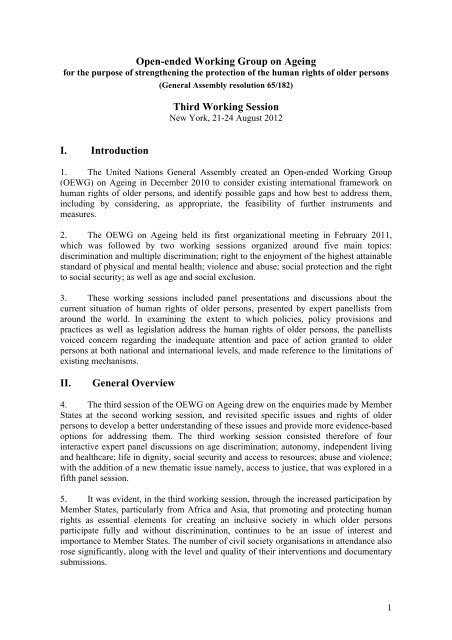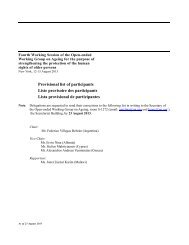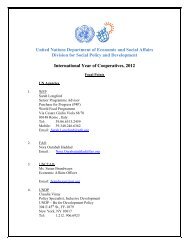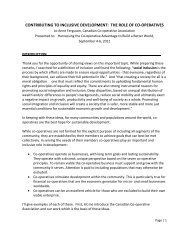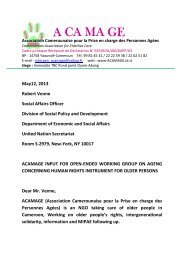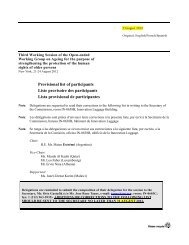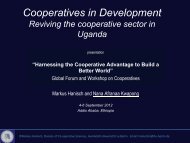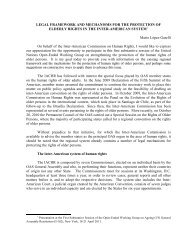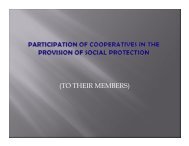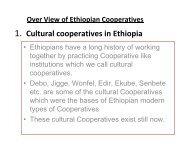Open-ended working group on Ageing for the purpose of ... - IAGG
Open-ended working group on Ageing for the purpose of ... - IAGG
Open-ended working group on Ageing for the purpose of ... - IAGG
Create successful ePaper yourself
Turn your PDF publications into a flip-book with our unique Google optimized e-Paper software.
<str<strong>on</strong>g>Open</str<strong>on</strong>g>-<str<strong>on</strong>g>ended</str<strong>on</strong>g> Working Group <strong>on</strong> <strong>Ageing</strong><br />
<strong>for</strong> <strong>the</strong> <strong>purpose</strong> <strong>of</strong> streng<strong>the</strong>ning <strong>the</strong> protecti<strong>on</strong> <strong>of</strong> <strong>the</strong> human rights <strong>of</strong> older pers<strong>on</strong>s<br />
(General Assembly resoluti<strong>on</strong> 65/182)<br />
Third Working Sessi<strong>on</strong><br />
New York, 21-24 August 2012<br />
I. Introducti<strong>on</strong><br />
1. The United Nati<strong>on</strong>s General Assembly created an <str<strong>on</strong>g>Open</str<strong>on</strong>g>-<str<strong>on</strong>g>ended</str<strong>on</strong>g> Working Group<br />
(OEWG) <strong>on</strong> <strong>Ageing</strong> in December 2010 to c<strong>on</strong>sider existing internati<strong>on</strong>al framework <strong>on</strong><br />
human rights <strong>of</strong> older pers<strong>on</strong>s, and identify possible gaps and how best to address <strong>the</strong>m,<br />
including by c<strong>on</strong>sidering, as appropriate, <strong>the</strong> feasibility <strong>of</strong> fur<strong>the</strong>r instruments and<br />
measures.<br />
2. The OEWG <strong>on</strong> <strong>Ageing</strong> held its first organizati<strong>on</strong>al meeting in February 2011,<br />
which was followed by two <str<strong>on</strong>g>working</str<strong>on</strong>g> sessi<strong>on</strong>s organized around five main topics:<br />
discriminati<strong>on</strong> and multiple discriminati<strong>on</strong>; right to <strong>the</strong> enjoyment <strong>of</strong> <strong>the</strong> highest attainable<br />
standard <strong>of</strong> physical and mental health; violence and abuse; social protecti<strong>on</strong> and <strong>the</strong> right<br />
to social security; as well as age and social exclusi<strong>on</strong>.<br />
3. These <str<strong>on</strong>g>working</str<strong>on</strong>g> sessi<strong>on</strong>s included panel presentati<strong>on</strong>s and discussi<strong>on</strong>s about <strong>the</strong><br />
current situati<strong>on</strong> <strong>of</strong> human rights <strong>of</strong> older pers<strong>on</strong>s, presented by expert panellists from<br />
around <strong>the</strong> world. In examining <strong>the</strong> extent to which policies, policy provisi<strong>on</strong>s and<br />
practices as well as legislati<strong>on</strong> address <strong>the</strong> human rights <strong>of</strong> older pers<strong>on</strong>s, <strong>the</strong> panellists<br />
voiced c<strong>on</strong>cern regarding <strong>the</strong> inadequate attenti<strong>on</strong> and pace <strong>of</strong> acti<strong>on</strong> granted to older<br />
pers<strong>on</strong>s at both nati<strong>on</strong>al and internati<strong>on</strong>al levels, and made reference to <strong>the</strong> limitati<strong>on</strong>s <strong>of</strong><br />
existing mechanisms.<br />
II.<br />
General Overview<br />
4. The third sessi<strong>on</strong> <strong>of</strong> <strong>the</strong> OEWG <strong>on</strong> <strong>Ageing</strong> drew <strong>on</strong> <strong>the</strong> enquiries made by Member<br />
States at <strong>the</strong> sec<strong>on</strong>d <str<strong>on</strong>g>working</str<strong>on</strong>g> sessi<strong>on</strong>, and revisited specific issues and rights <strong>of</strong> older<br />
pers<strong>on</strong>s to develop a better understanding <strong>of</strong> <strong>the</strong>se issues and provide more evidence-based<br />
opti<strong>on</strong>s <strong>for</strong> addressing <strong>the</strong>m. The third <str<strong>on</strong>g>working</str<strong>on</strong>g> sessi<strong>on</strong> c<strong>on</strong>sisted <strong>the</strong>re<strong>for</strong>e <strong>of</strong> four<br />
interactive expert panel discussi<strong>on</strong>s <strong>on</strong> age discriminati<strong>on</strong>; aut<strong>on</strong>omy, independent living<br />
and healthcare; life in dignity, social security and access to resources; abuse and violence;<br />
with <strong>the</strong> additi<strong>on</strong> <strong>of</strong> a new <strong>the</strong>matic issue namely, access to justice, that was explored in a<br />
fifth panel sessi<strong>on</strong>.<br />
5. It was evident, in <strong>the</strong> third <str<strong>on</strong>g>working</str<strong>on</strong>g> sessi<strong>on</strong>, through <strong>the</strong> increased participati<strong>on</strong> by<br />
Member States, particularly from Africa and Asia, that promoting and protecting human<br />
rights as essential elements <strong>for</strong> creating an inclusive society in which older pers<strong>on</strong>s<br />
participate fully and without discriminati<strong>on</strong>, c<strong>on</strong>tinues to be an issue <strong>of</strong> interest and<br />
importance to Member States. The number <strong>of</strong> civil society organisati<strong>on</strong>s in attendance also<br />
rose significantly, al<strong>on</strong>g with <strong>the</strong> level and quality <strong>of</strong> <strong>the</strong>ir interventi<strong>on</strong>s and documentary<br />
submissi<strong>on</strong>s.<br />
1
6. In <strong>the</strong>ir general statements, several countries expressed that existing internati<strong>on</strong>al<br />
human rights standards and principles apply to older pers<strong>on</strong>s, including <strong>the</strong> right to health,<br />
social security as well as <strong>the</strong> prohibiti<strong>on</strong> <strong>of</strong> violence and discriminati<strong>on</strong>, and that current<br />
deficiencies in <strong>the</strong> protecti<strong>on</strong> <strong>of</strong> <strong>the</strong> rights <strong>of</strong> older pers<strong>on</strong>s could be addressed by more<br />
effective implementati<strong>on</strong> <strong>of</strong> <strong>the</strong>se existing mechanisms. Delegati<strong>on</strong>s highlighted <strong>the</strong><br />
importance <strong>of</strong> sharing best practices and c<strong>on</strong>sidering how to build <strong>on</strong> available initiatives<br />
at <strong>the</strong> nati<strong>on</strong>al, regi<strong>on</strong>al, interregi<strong>on</strong>al and internati<strong>on</strong>al levels to address <strong>the</strong> main causes<br />
<strong>of</strong> protecti<strong>on</strong> gaps and age discriminati<strong>on</strong>.<br />
7. Several o<strong>the</strong>r countries focused <strong>the</strong>ir attenti<strong>on</strong> <strong>on</strong> <strong>the</strong> need to ensure a more<br />
comprehensive protecti<strong>on</strong> <strong>of</strong> <strong>the</strong> human rights <strong>of</strong> older pers<strong>on</strong>s, pointing out to existing<br />
normative and protecti<strong>on</strong> gaps. Some delegates stated that while existing human rights<br />
c<strong>on</strong>venti<strong>on</strong>s <strong>of</strong>fer c<strong>on</strong>siderable potential to promote and protect <strong>the</strong> rights <strong>of</strong> older pers<strong>on</strong>s,<br />
this potential was not being tapped, and that <strong>the</strong> existing internati<strong>on</strong>al framework is not<br />
specific enough to address and provide enough protecti<strong>on</strong> <strong>for</strong> older pers<strong>on</strong>s. Speakers<br />
called <strong>for</strong> drafting a new internati<strong>on</strong>al instrument, a United Nati<strong>on</strong>s c<strong>on</strong>venti<strong>on</strong> <strong>on</strong> <strong>the</strong><br />
rights <strong>of</strong> older pers<strong>on</strong>s, to provide a binding treaty that identifies <strong>the</strong> rights <strong>of</strong> older<br />
pers<strong>on</strong>s as well as <strong>the</strong> obligati<strong>on</strong>s <strong>of</strong> State parties to <strong>the</strong> c<strong>on</strong>venti<strong>on</strong> to promote, protect and<br />
ensure those rights.<br />
8. Some representatives <strong>of</strong> civil society organizati<strong>on</strong>s and networks cauti<strong>on</strong>ed that<br />
age discriminati<strong>on</strong> and ageism are widely tolerated across <strong>the</strong> world and that older pers<strong>on</strong>s<br />
c<strong>on</strong>tinue to be highly vulnerable to abuse, deprivati<strong>on</strong> and exclusi<strong>on</strong>. They called <strong>for</strong> <strong>the</strong><br />
establishment <strong>of</strong> a c<strong>on</strong>venti<strong>on</strong> <strong>on</strong> <strong>the</strong> rights <strong>of</strong> older pers<strong>on</strong>s, as <strong>the</strong> <strong>on</strong>ly real means to<br />
ensure <strong>the</strong> protecti<strong>on</strong> <strong>of</strong> <strong>the</strong> human rights <strong>of</strong> older pers<strong>on</strong>s. Civil society organizati<strong>on</strong>s and<br />
networks urged Member States to c<strong>on</strong>tinue and support <strong>the</strong> dialogue through <strong>the</strong> OEWG<br />
and to ensure that <strong>the</strong> needs <strong>of</strong> older pers<strong>on</strong>s are reflected in nati<strong>on</strong>al and internati<strong>on</strong>al<br />
development policies, as well as in <strong>the</strong> planning and delivery <strong>of</strong> basic social services at all<br />
levels.<br />
9. The opti<strong>on</strong> <strong>of</strong> appointing a special Rapporteur or independent expert <strong>of</strong> <strong>the</strong> Human<br />
Rights Council <strong>on</strong> <strong>the</strong> rights <strong>of</strong> older pers<strong>on</strong>s was welcomed by several Member States. A<br />
Special Rapport could be entrusted to examine, m<strong>on</strong>itor and advise <strong>on</strong> <strong>the</strong> situati<strong>on</strong> <strong>of</strong><br />
older pers<strong>on</strong>s and to establish standards and good practices that target full and equal<br />
enjoyment <strong>of</strong> all human rights and fundamental freedoms by older pers<strong>on</strong>s without<br />
discriminati<strong>on</strong>.<br />
10. Mainstreaming <strong>the</strong> rights <strong>of</strong> older pers<strong>on</strong>s within existing human rights framework,<br />
including treaty bodies, universal periodic review processes, special mandate holders, as<br />
well as within <strong>the</strong> activities <strong>of</strong> United Nati<strong>on</strong>s entities that have adopted a rights-based<br />
approach, were menti<strong>on</strong>ed by many speakers. Delegates at large called <strong>for</strong> <strong>the</strong> greater<br />
involvement <strong>of</strong> nati<strong>on</strong>al human rights instituti<strong>on</strong>s and <strong>for</strong> intensified cooperati<strong>on</strong> with civil<br />
society actors as well as <strong>the</strong> private sector, <strong>for</strong> <strong>the</strong> improvement <strong>of</strong> <strong>the</strong> c<strong>on</strong>diti<strong>on</strong> <strong>of</strong> older<br />
pers<strong>on</strong>s.<br />
11. Delegati<strong>on</strong>s and representatives from civil society organizati<strong>on</strong>s and networks<br />
agreed <strong>on</strong> <strong>the</strong> urgency <strong>of</strong> <strong>the</strong> situati<strong>on</strong> <strong>of</strong> older pers<strong>on</strong>s, and <strong>the</strong> need to c<strong>on</strong>tinue<br />
meaningful and comprehensive discussi<strong>on</strong>s within <strong>the</strong> United Nati<strong>on</strong>s <strong>on</strong> ageing issues;<br />
mainly through <strong>the</strong> essential work <strong>of</strong> <strong>the</strong> OEWG <strong>on</strong> <strong>Ageing</strong>, as well as <strong>the</strong> important<br />
c<strong>on</strong>tributi<strong>on</strong> <strong>of</strong> <strong>the</strong> 51 st sessi<strong>on</strong> <strong>of</strong> <strong>the</strong> Commissi<strong>on</strong> <strong>on</strong> Social Development in 2013, in<br />
2
which <strong>the</strong> results <strong>of</strong> <strong>the</strong> sec<strong>on</strong>d global review and appraisal <strong>of</strong> <strong>the</strong> Madrid Internati<strong>on</strong>al<br />
Plan <strong>of</strong> Acti<strong>on</strong> <strong>on</strong> <strong>Ageing</strong> (MIPAA), will be c<strong>on</strong>ducted.<br />
III.<br />
Summaries <strong>of</strong> Panel Discussi<strong>on</strong>s<br />
Sec<strong>on</strong>d meeting <strong>of</strong> <strong>the</strong> Third Working Group<br />
21 August 2012 (p.m.)<br />
Panel 1: Age Discriminati<strong>on</strong> (moderated by Mr. Charles Radcliffe, Chief <strong>of</strong> Global Issues<br />
Secti<strong>on</strong> at <strong>the</strong> Office <strong>of</strong> <strong>the</strong> High Commissi<strong>on</strong>er <strong>for</strong> Human Rights)<br />
12. Mr. Alejandro Morlachetti, Pr<strong>of</strong>essor <strong>of</strong> Law at <strong>the</strong> University <strong>of</strong> Buenos<br />
Aires in Argentina, in<strong>for</strong>med <strong>the</strong> Working Group about n<strong>on</strong>-discriminati<strong>on</strong> clauses in<br />
internati<strong>on</strong>al human rights treaties, namely <strong>the</strong> Committee <strong>on</strong> <strong>the</strong> Eliminati<strong>on</strong> <strong>of</strong><br />
Discriminati<strong>on</strong> against Women (CEDAW) and <strong>the</strong> C<strong>on</strong>venti<strong>on</strong> <strong>on</strong> <strong>the</strong> Rights <strong>of</strong> Pers<strong>on</strong>s<br />
with Disabilities (CRPD), and about n<strong>on</strong>-discriminati<strong>on</strong> <strong>of</strong> older pers<strong>on</strong>s in <strong>the</strong> Inter-<br />
American system. He pointed out that <strong>the</strong> American C<strong>on</strong>venti<strong>on</strong> <strong>of</strong> Human Rights does<br />
not list age am<strong>on</strong>g <strong>the</strong> grounds <strong>of</strong> discriminati<strong>on</strong>. While age is explicitly menti<strong>on</strong>ed in<br />
various general comments <strong>of</strong> internati<strong>on</strong>al human rights treaties, <strong>the</strong> questi<strong>on</strong> remains<br />
whe<strong>the</strong>r this is sufficient <strong>on</strong> normative grounds. In additi<strong>on</strong>, he noted that general<br />
comments have been c<strong>on</strong>sidered by Member States as n<strong>on</strong>-binding and that Member<br />
States rarely include references to older pers<strong>on</strong>s in <strong>the</strong>ir reports to treaty bodies. In<br />
c<strong>on</strong>clusi<strong>on</strong>, Mr. Morlachetti stated that an internati<strong>on</strong>al c<strong>on</strong>venti<strong>on</strong> <strong>on</strong> <strong>the</strong> rights <strong>of</strong> older<br />
pers<strong>on</strong>s would (a) reaffirm basic principles <strong>of</strong> equality and n<strong>on</strong>-discriminati<strong>on</strong>; (b)<br />
establish age as a class that deserves protecti<strong>on</strong>; (c) clarify States’ resp<strong>on</strong>sibilities, (d)<br />
provide a framework <strong>for</strong> acti<strong>on</strong>; (e) recognize and protect older pers<strong>on</strong>s from multiple<br />
discriminati<strong>on</strong>; (f) provide a mandate to adopt special measures; and (g) ensure a reporting<br />
and accountability mechanism.<br />
13. Ms. Louise Richards<strong>on</strong>, Vice-President <strong>of</strong> AGE Plat<strong>for</strong>m Europe, addressed<br />
age discriminati<strong>on</strong> in Europe. Despite existing European Uni<strong>on</strong> legislati<strong>on</strong>, age<br />
inequalities are not dealt with adequately throughout <strong>the</strong> European Uni<strong>on</strong>. She noted<br />
prevailing discriminati<strong>on</strong> in employment and in advertising job openings as well as<br />
barriers to access to financial services and to complimentary health insurance, while also<br />
providing good practices in <strong>the</strong>se areas. She spoke about multiple discriminati<strong>on</strong> with<br />
regard to age, and exemplified that by citing discriminati<strong>on</strong> against older women, older<br />
migrants and older lesbian, gay, bisexual, and transgender pers<strong>on</strong>s (LGBT). To address<br />
<strong>the</strong>se issues, Ms. Richards<strong>on</strong> provided <strong>the</strong> <str<strong>on</strong>g>working</str<strong>on</strong>g> <str<strong>on</strong>g>group</str<strong>on</strong>g> with recommendati<strong>on</strong>s, namely<br />
to (a) adopt effective legislati<strong>on</strong> to combat age discriminati<strong>on</strong> in access to essential goods<br />
and services; (b) combat stereotypes about older workers; (c) c<strong>on</strong>sult n<strong>on</strong>-governmental<br />
organisati<strong>on</strong>s to identify percepti<strong>on</strong> <strong>of</strong> fundamental rights; (d) enhance <strong>the</strong> understanding<br />
<strong>of</strong> barriers encountered by older pers<strong>on</strong>s facing multiple discriminati<strong>on</strong>; (e) m<strong>on</strong>itor age<br />
discriminati<strong>on</strong> in access to healthcare and financial services; and (f) remove barriers to <strong>the</strong><br />
‘silver ec<strong>on</strong>omy.’<br />
14. Ms. Susan Ryan, Age Discriminati<strong>on</strong> Commissi<strong>on</strong>er <strong>of</strong> Australia, presented <strong>the</strong><br />
experience <strong>of</strong> her mandate regarding age discriminati<strong>on</strong>. She discussed discriminatory<br />
attitudes and work<strong>for</strong>ce barriers facing older pers<strong>on</strong>s in Australia, including discriminati<strong>on</strong><br />
in employment, workers’ compensati<strong>on</strong>, as well as income protecti<strong>on</strong> issues. Ms. Ryan<br />
argues <strong>for</strong> <strong>the</strong> need <strong>for</strong> an older work<strong>for</strong>ce in Australia, in order to in order to (a) meet<br />
labour market requirements; (b) accommodate an increase in <strong>the</strong> pensi<strong>on</strong> age; and (c)<br />
3
educe <strong>the</strong> costs <strong>of</strong> ageing to <strong>the</strong> ec<strong>on</strong>omy. She noted that <strong>the</strong> Australian Law Re<strong>for</strong>m<br />
Commissi<strong>on</strong> has been tasked with inquiring into Comm<strong>on</strong>wealth laws that discriminate <strong>on</strong><br />
<strong>the</strong> basis <strong>of</strong> age, including superannuati<strong>on</strong> law; family assistance; child support; social<br />
security law; employment law; insurance law; compensati<strong>on</strong> laws; and any o<strong>the</strong>r relevant<br />
Comm<strong>on</strong>wealth legislati<strong>on</strong> exempt under <strong>the</strong> Age Discriminati<strong>on</strong> Act 2004. Ms. Ryan<br />
called <strong>for</strong> age healthcare re<strong>for</strong>ms, and recomm<str<strong>on</strong>g>ended</str<strong>on</strong>g> (a) <strong>the</strong> incorporati<strong>on</strong> <strong>of</strong> indicators to<br />
m<strong>on</strong>itor <strong>the</strong> implementati<strong>on</strong> <strong>of</strong> c<strong>on</strong>sumer directed care; (b) <strong>the</strong> implementati<strong>on</strong> <strong>of</strong> advance<br />
care training programmes; (c) development <strong>of</strong> disaggregated indicators, at least <strong>on</strong> <strong>the</strong><br />
grounds <strong>of</strong> sex, race, ethnicity, sexuality, socioec<strong>on</strong>omic status, and place <strong>of</strong> residence; (d)<br />
improvement <strong>of</strong> <strong>the</strong> effectiveness <strong>of</strong> ‘Broadband <strong>for</strong> Seniors Initiative’ to ensure that older<br />
pers<strong>on</strong>s are c<strong>on</strong>fident internet users; as well as (e) human rights training <strong>for</strong> health<br />
workers. Ms. Ryan emphasised <strong>for</strong> <strong>the</strong> need to develop materials <strong>on</strong> financial literacy<br />
older pers<strong>on</strong>s, and c<strong>on</strong>cluded by calling <strong>for</strong> <strong>the</strong> c<strong>on</strong>solidati<strong>on</strong> <strong>of</strong> five federal antidiscriminati<strong>on</strong><br />
acts in Australia to simplify relevant laws and extend protecti<strong>on</strong>s to older<br />
pers<strong>on</strong>s <strong>on</strong> <strong>the</strong> grounds <strong>of</strong> sexual orientati<strong>on</strong> and gender identity.<br />
15. During <strong>the</strong> interactive dialogue, several Member States and civil society<br />
organizati<strong>on</strong>s emphasized <strong>the</strong> centrality <strong>of</strong> areas <strong>of</strong> age discriminati<strong>on</strong> as outlined by <strong>the</strong><br />
panellists. Some delegates provided examples <strong>of</strong> policy resp<strong>on</strong>ses that were initiated by<br />
<strong>the</strong>ir governments, such as age anti-discriminati<strong>on</strong> laws addressing employment and <strong>the</strong><br />
labour market, measures to overcome stereotypes <strong>of</strong> old age, measures <strong>for</strong> age-friendly<br />
communities and legislative acti<strong>on</strong> to ensure access to goods and services. O<strong>the</strong>rs<br />
in<strong>for</strong>med <strong>the</strong> Working Group about <strong>the</strong> upcoming sec<strong>on</strong>d ministerial c<strong>on</strong>ference in Vienna<br />
and <strong>on</strong>going negotiati<strong>on</strong>s to adopt a Ministerial Declarati<strong>on</strong>. The United Nati<strong>on</strong>s regi<strong>on</strong>al<br />
commissi<strong>on</strong> ECLAC spoke about <strong>the</strong> results <strong>of</strong> <strong>the</strong> regi<strong>on</strong>al intergovernmental c<strong>on</strong>ference<br />
<strong>on</strong> <strong>Ageing</strong> in Latin America and <strong>the</strong> Caribbean, which was held in San Jose, Costa Rica.<br />
Third meeting <strong>of</strong> <strong>the</strong> Third Working Group<br />
22 August 2012 (a.m.)<br />
Panel 2: Aut<strong>on</strong>omy, Independent Living and Healthcare (moderated by Ms. Najat El<br />
Mekkaoui, member <strong>of</strong> <strong>the</strong> Morocco Nati<strong>on</strong>al Council <strong>of</strong> Human Rights, and an expert <strong>on</strong><br />
social protecti<strong>on</strong> <strong>for</strong> older people)<br />
16. Ms. Amanda McRae, Disability Rights Researcher at Human Rights Watch,<br />
organized her presentati<strong>on</strong> around three main topics: (a) defining palliative care; (b)<br />
exploring how palliative care affects older pers<strong>on</strong>s; and (c) linking human rights to<br />
palliative care. Ms. McRae presented specific examples from <strong>the</strong> field, namely India and<br />
Ukraine. In her recommendati<strong>on</strong>s, Ms. McRae stated that existing internati<strong>on</strong>al<br />
frameworks <strong>of</strong> <strong>the</strong> human rights <strong>for</strong> older pers<strong>on</strong>s have fallen short <strong>of</strong> securing older<br />
pers<strong>on</strong>s’ rights to <strong>the</strong> highest attainable standard <strong>of</strong> health, including access to palliative<br />
care. She called <strong>for</strong> a legally binding standard, including an explicit reference to <strong>the</strong> right<br />
to palliative care.<br />
17. Ms. Athina-Eleni Georgantzi, Legal and Research Officer at AGE Plat<strong>for</strong>m<br />
Europe, focused her presentati<strong>on</strong> <strong>on</strong> aut<strong>on</strong>omy and independent living in relati<strong>on</strong> to<br />
different care settings. She highlighted insights <strong>on</strong> <strong>the</strong> reality <strong>of</strong> barriers that older pers<strong>on</strong>s<br />
face in <strong>the</strong> enjoyment <strong>of</strong> <strong>the</strong>ir human rights. Ms. Georgantzi also discussed <strong>the</strong> need to<br />
move toward a rights-based approach to ageing. She c<strong>on</strong>cluded that <strong>the</strong> opti<strong>on</strong> <strong>of</strong> an<br />
internati<strong>on</strong>al c<strong>on</strong>venti<strong>on</strong> would: (a) enhance public awareness <strong>on</strong> <strong>the</strong> rights <strong>of</strong> older<br />
pers<strong>on</strong>s in terms <strong>of</strong> aut<strong>on</strong>omy and independent living; (b) promote a social model <strong>of</strong><br />
4
ageing and streng<strong>the</strong>n visibility <strong>of</strong> older people as rights holders; (c) close loopholes in<br />
existing legal frameworks; (d) give member States a c<strong>on</strong>crete obligati<strong>on</strong> to respect, protect<br />
and fulfil <strong>the</strong>se rights; and (e) act as a catalyst <strong>for</strong> data collecti<strong>on</strong> and age-appropriate<br />
policies, ensuring that <strong>the</strong>re are no discrepancies in <strong>the</strong> understanding and en<strong>for</strong>cement <strong>of</strong><br />
older pers<strong>on</strong>s’ rights.<br />
18. Mr. Horst Krumbach, Nursing Home Administrator and CEO <strong>of</strong><br />
Generati<strong>on</strong>sbruecke Deutschland, called <strong>for</strong> paying more attenti<strong>on</strong> to elderly citizens,<br />
especially care recipients, and <strong>the</strong>ir needs. He explained how Generati<strong>on</strong>sbrücke<br />
Deutschland initiates, directs, and supervises regular meetings between nursing home<br />
residents and <str<strong>on</strong>g>group</str<strong>on</strong>g>s <strong>of</strong> school children with <strong>the</strong> aim to enhance l<strong>on</strong>g-term quality and<br />
enjoyment <strong>of</strong> life <strong>of</strong> all involved, especially <strong>of</strong> dementia patients, and raise young people’s<br />
awareness <strong>of</strong> <strong>the</strong> lives and needs <strong>of</strong> older pers<strong>on</strong>s.<br />
19. During <strong>the</strong> interactive dialogue, several delegati<strong>on</strong>s and civil society representatives<br />
reiterated <strong>the</strong> importance <strong>of</strong> public health services and preventive strategies in ensuring<br />
aut<strong>on</strong>omy, independent living and wellbeing <strong>of</strong> older pers<strong>on</strong>s. There was an emphasis <strong>on</strong> <strong>the</strong><br />
need to identify and reduce discrepancies at <strong>the</strong> nati<strong>on</strong>al, regi<strong>on</strong>al and internati<strong>on</strong>al levels.<br />
Several delegati<strong>on</strong>s and civil society representatives called <strong>for</strong> a rights-based approach to<br />
health, with special attenti<strong>on</strong> to gender, disability, ethnic origin and area <strong>of</strong> residence. Specific<br />
topics raised included intergenerati<strong>on</strong>al dialogue and solidarity; l<strong>on</strong>g-term care and care<br />
provided at home; <strong>the</strong> need to respect <strong>the</strong> aut<strong>on</strong>omy, will and preferences <strong>of</strong> older pers<strong>on</strong>s; as<br />
well as <strong>the</strong> need <strong>for</strong> c<strong>on</strong>sidering <strong>the</strong> overlap between old age and disability from a social<br />
model perspective to avoid double discriminati<strong>on</strong>. Also highlighted were challenges relating to<br />
<strong>the</strong> shortage <strong>of</strong> qualified medical staff, especially in rural areas where older people have<br />
limited mobility, in additi<strong>on</strong> to <strong>the</strong> need <strong>for</strong> capacity building <strong>of</strong> facilities and pers<strong>on</strong>nel,<br />
including in<strong>for</strong>mal caregivers, to meet <strong>the</strong> special needs <strong>of</strong> older pers<strong>on</strong>s.<br />
Fourth meeting <strong>of</strong> <strong>the</strong> Third Working Group<br />
22 August 2012 (p.m.)<br />
Panel 3: Life in Dignity, Social Security and Access to Resources (moderated by Louise<br />
Richards<strong>on</strong>, Vice-president <strong>of</strong> AGE Plat<strong>for</strong>m)<br />
20. Ms. Anne-Mette Kjaer Hesselager, Head <strong>of</strong> Secti<strong>on</strong>, Law and Internati<strong>on</strong>al,<br />
Danish Ministry <strong>of</strong> Social Affairs and Integrati<strong>on</strong>, in<strong>for</strong>med <strong>the</strong> <str<strong>on</strong>g>working</str<strong>on</strong>g> <str<strong>on</strong>g>group</str<strong>on</strong>g> that <strong>the</strong><br />
commitment <strong>for</strong> social security in Denmark is underpinned by <strong>the</strong> internati<strong>on</strong>al<br />
framework, including various United Nati<strong>on</strong>s c<strong>on</strong>venti<strong>on</strong>s and <strong>the</strong> Madrid Plan. As<br />
pointed out in <strong>the</strong> European Report <strong>on</strong> Development 2010, universal access to basic social<br />
protecti<strong>on</strong> is feasible and af<strong>for</strong>dable. The Danish C<strong>on</strong>solidati<strong>on</strong> Act <strong>on</strong> Social Services<br />
stipulates that all adults with impaired physical and mental functi<strong>on</strong> shall receive<br />
necessary assistance based <strong>on</strong> an individual needs assessment. L<strong>on</strong>g-term case services<br />
cover assistance with pers<strong>on</strong>al hygiene, getting in or out <strong>of</strong> bed, or getting dressed.<br />
Practical assistance at home may be assistance with cleaning, laundering or shopping. In<br />
additi<strong>on</strong>, palliative care and rehabilitative services are available <strong>for</strong> older pers<strong>on</strong>s in<br />
Denmark. The overall policy approach to demographic ageing in Denmark rests has three<br />
elements: (a) fully utilize <strong>the</strong> potential <strong>of</strong> civil society in <strong>the</strong> social sector; (b) support<br />
older pers<strong>on</strong>s’ opportunities to stay l<strong>on</strong>ger in <strong>the</strong> labour market; and (c) invest in new<br />
soluti<strong>on</strong>s to l<strong>on</strong>g-term care, including welfare technology. As a result, legislati<strong>on</strong> <strong>on</strong> social<br />
pensi<strong>on</strong> was am<str<strong>on</strong>g>ended</str<strong>on</strong>g> in 2008 to give pensi<strong>on</strong>ers incentives to work. Overall, Denmark<br />
has developed a very elaborate social protecti<strong>on</strong> model and is focusing <strong>on</strong> adapting it to<br />
<strong>the</strong> changing demographics <strong>of</strong> <strong>the</strong> coming generati<strong>on</strong>s.<br />
5
21. Mr. Alejandro Morlachetti, Pr<strong>of</strong>essor <strong>of</strong> Law at <strong>the</strong> University <strong>of</strong> Buenos<br />
Aires in Argentina, gave a presentati<strong>on</strong> centred <strong>on</strong> adequate standard <strong>of</strong> living, right to<br />
social security and right to work. He pointed out that adequate standard <strong>of</strong> living <strong>for</strong> older<br />
pers<strong>on</strong>s is addressed in <strong>the</strong> Internati<strong>on</strong>al Covenant <strong>on</strong> Ec<strong>on</strong>omic, Social and Cultural<br />
Rights (ICESCR) and <strong>for</strong> pers<strong>on</strong>s with disabilities in <strong>the</strong> C<strong>on</strong>venti<strong>on</strong> <strong>on</strong> <strong>the</strong> Rights <strong>of</strong><br />
Pers<strong>on</strong>s with Disabilities (CRPD). Likewise <strong>the</strong> right to social security is based <strong>on</strong><br />
provisi<strong>on</strong>s in various internati<strong>on</strong>al legal instruments, such as <strong>the</strong> Universal Declarati<strong>on</strong> <strong>of</strong><br />
Human Rights (UDHR), <strong>the</strong> Internati<strong>on</strong>al Covenant <strong>on</strong> Ec<strong>on</strong>omic, Social and Cultural<br />
Rights, <strong>the</strong> C<strong>on</strong>venti<strong>on</strong> <strong>on</strong> <strong>the</strong> Eliminati<strong>on</strong> <strong>of</strong> Discriminati<strong>on</strong> against Women (CEDAW)<br />
and <strong>the</strong> Internati<strong>on</strong>al Labour Organisati<strong>on</strong> (ILO) c<strong>on</strong>venti<strong>on</strong>s. General Comment 19 <strong>of</strong> <strong>the</strong><br />
Committee <strong>on</strong> ESCR states that social security should cover sickness, unemployment,<br />
employment injury, family and child support, maternity, disability, and survivors and<br />
orphans. The Special Rapporteur <strong>on</strong> human rights and extreme poverty highlighted that<br />
c<strong>on</strong>tributory systems <strong>of</strong> social security accentuate gender inequalities with older women<br />
more likely to receive lower pensi<strong>on</strong>s. The right to work has been enshrined in <strong>the</strong> UDHR,<br />
CERD, CEDAW, CRPD and ICESCR. Despite <strong>the</strong> menti<strong>on</strong>ing <strong>of</strong> <strong>the</strong>se issues in various<br />
instruments, a more coherent approach could be c<strong>on</strong>sidered in relati<strong>on</strong> to older pers<strong>on</strong>s.<br />
Mr. Morlachetti provided <strong>the</strong> <str<strong>on</strong>g>working</str<strong>on</strong>g> <str<strong>on</strong>g>group</str<strong>on</strong>g> with recommendati<strong>on</strong>s in this regard: (a) with<br />
regard to <strong>the</strong> right to work, define clear standards regarding age, particularly regarding <strong>the</strong><br />
parameter to assess <strong>the</strong> justificati<strong>on</strong> <strong>for</strong> age limits; and (b) c<strong>on</strong>sider clear standards, ideally<br />
a binding instrument in order to advance understanding <strong>of</strong> <strong>the</strong> implicati<strong>on</strong>s <strong>of</strong> <strong>the</strong> right to<br />
social security.<br />
22. Ms. Najat El Mekkaoui, member <strong>of</strong> <strong>the</strong> Morocco Nati<strong>on</strong>al Council <strong>of</strong> Human<br />
Rights, addressed ageing, resources and poverty in Morocco. The country has <strong>on</strong>e <strong>of</strong> <strong>the</strong><br />
lowest levels <strong>of</strong> pensi<strong>on</strong> benefits and health insurance in <strong>the</strong> Maghreb. Only 16% <strong>of</strong> older<br />
pers<strong>on</strong>s receive a pensi<strong>on</strong> benefit, 83% are illiterate and 83.7% have no health coverage,<br />
more than 58.9% have chr<strong>on</strong>ic illnesses and <strong>for</strong> 58.6% <strong>the</strong>ir children are <strong>the</strong> <strong>on</strong>ly source <strong>of</strong><br />
support. There are four public pensi<strong>on</strong> schemes and two pr<strong>of</strong>essi<strong>on</strong>al pensi<strong>on</strong> schemes.<br />
Currently, pensi<strong>on</strong> re<strong>for</strong>m is under discussi<strong>on</strong>. A plan <strong>for</strong> older people was adopted in<br />
2010 and <strong>the</strong> pensi<strong>on</strong> income doubled from 1996 to 2011. In additi<strong>on</strong>, acti<strong>on</strong> to reduce<br />
poverty was taken, social housing was enhanced and <strong>the</strong> Government plans to increase <strong>the</strong><br />
percentage <strong>of</strong> <strong>the</strong> populati<strong>on</strong> with health insurance. Ms. Mekkaoui’s recommendati<strong>on</strong>s to<br />
address <strong>the</strong>se issues were: (a) social protecti<strong>on</strong> coverage <strong>for</strong> all workers (<strong>for</strong>mal and<br />
in<strong>for</strong>mal); (b) a comprehensive pensi<strong>on</strong> re<strong>for</strong>m; and (c) a better understanding <strong>of</strong> <strong>the</strong><br />
effectiveness <strong>of</strong> pensi<strong>on</strong> and health systems by collecting more disaggregated data.<br />
23. During <strong>the</strong> inter-active dialogue, some Member States and civil society<br />
organizati<strong>on</strong>s deliberated <strong>on</strong> issues related to addressing cuts in social security, <strong>the</strong> right to<br />
sufficient income <strong>for</strong> older pers<strong>on</strong>s, as well as inclusi<strong>on</strong> <strong>of</strong> <strong>the</strong> in<strong>for</strong>mal sector and women<br />
regarding basic income in old age. O<strong>the</strong>r issues raised included active societal<br />
participati<strong>on</strong> <strong>of</strong> older pers<strong>on</strong>s after retirement, such as volunteering; best practices<br />
regarding employment <strong>of</strong> older pers<strong>on</strong>s; older migratory workers; and an internati<strong>on</strong>al<br />
legal instrument and how it could define requirements and resp<strong>on</strong>sibilities by<br />
governments.<br />
6
Fifth meeting <strong>of</strong> <strong>the</strong> Third Working Group<br />
23 August 2012 (a.m.)<br />
Panel 4: Abuse and Violence (moderated by Ms. Maarit Koh<strong>on</strong>en Sheriff, Deputy Head <strong>of</strong><br />
Office and Chief <strong>of</strong> Geographic Issues <strong>of</strong> <strong>the</strong> Office <strong>of</strong> <strong>the</strong> High Commissi<strong>on</strong>er <strong>on</strong> Human<br />
Rights)<br />
24. Ms. Nena Georgantzi, Legal and Research Officer, AGE Plat<strong>for</strong>m Europe,<br />
noted that combating ageism and gender discriminati<strong>on</strong> is key to any policy targeting elder<br />
abuse. She noted <strong>the</strong> need <strong>for</strong>a comm<strong>on</strong> definiti<strong>on</strong> enshrined in an internati<strong>on</strong>al human<br />
rights instrument to build a comm<strong>on</strong>ly accepted definiti<strong>on</strong>, as it would help <strong>the</strong> screening<br />
<strong>of</strong> <strong>the</strong> different <strong>for</strong>ms <strong>of</strong> elder abuse and would have a str<strong>on</strong>ger preventive effect. Ms.<br />
Georgantzi stated that while elder abuse is <strong>on</strong> <strong>the</strong> European Uni<strong>on</strong>’s agenda, legal<br />
protecti<strong>on</strong> <strong>of</strong> elder abuse remains very much fragmented across <strong>the</strong> regi<strong>on</strong>’s member<br />
States and rarely does is target older people. Moreover, s<strong>of</strong>t-law approaches to elder abuse<br />
entail protecti<strong>on</strong> gaps. Ms. Georgantzi called <strong>for</strong> a more comprehensive European Uni<strong>on</strong>wide<br />
resp<strong>on</strong>se, which is also binding in nature. She c<strong>on</strong>cluded that <strong>on</strong>ly with raised<br />
awareness, a comm<strong>on</strong> analysis and visi<strong>on</strong> <strong>on</strong> elder abuse, a better coordinati<strong>on</strong> and<br />
exchange <strong>of</strong> in<strong>for</strong>mati<strong>on</strong> between stakeholders, as well as improved data ga<strong>the</strong>ring would<br />
<strong>the</strong>re be an enabling envir<strong>on</strong>ment where older pers<strong>on</strong>s are able to enjoy claim <strong>the</strong>ir rights.<br />
25. Dr. K.R. Gangadharan, President, Internati<strong>on</strong>al Federati<strong>on</strong> <strong>on</strong> <strong>Ageing</strong>, as<br />
well as <strong>the</strong> Chairman <strong>of</strong> Heritage Foundati<strong>on</strong> in Hyderabad India, shared his<br />
experience with <strong>the</strong> Heritage Hospital, a multi-specialty geriatric healthcare facility in<br />
Hyderabad, where he noted <strong>the</strong> prevalent belief that older pers<strong>on</strong>s are perceived as<br />
worthless in today’s fast-paced, globalised and increasingly industrialized world. Dr.<br />
Gangadharan shared his c<strong>on</strong>cerns about <strong>the</strong> scope <strong>of</strong> violence and abuse <strong>of</strong> older pers<strong>on</strong>s<br />
despite <strong>the</strong> growing number <strong>of</strong> internati<strong>on</strong>al <strong>for</strong>ums <strong>on</strong> <strong>the</strong> preventi<strong>on</strong> <strong>of</strong> elder abuse. He<br />
highlighted poverty, illiteracy, rural dwelling and feminisati<strong>on</strong> as potential factors <strong>for</strong> high<br />
risk to such abuse. Am<strong>on</strong>g existing legal protecti<strong>on</strong> against elder violence, India has<br />
developed a nati<strong>on</strong>al programme <strong>for</strong> <strong>the</strong> health care <strong>of</strong> <strong>the</strong> elderly. Additi<strong>on</strong>ally, in 2007,<br />
<strong>the</strong> Maintenance and Welfare <strong>of</strong> Parents and Senior Citizens Act was adopted, and is<br />
currently under revisi<strong>on</strong>. Since 1999, <strong>the</strong>re is a nati<strong>on</strong>al policy <strong>on</strong> older pers<strong>on</strong>s. The<br />
challenge, Dr. K. R. Gangadharan pointed out, is <strong>the</strong> lack <strong>of</strong> implementati<strong>on</strong> <strong>of</strong> <strong>the</strong><br />
policies in place, ra<strong>the</strong>r than lack <strong>of</strong> legal protecti<strong>on</strong>.<br />
26. Ms. Claudia Martin, Co-Director <strong>of</strong> <strong>the</strong> Academy <strong>on</strong> Human Rights and<br />
Humanitarian Law, highlighted that existing human rights law are currently too<br />
fragmented, with regard to <strong>the</strong> protecti<strong>on</strong> <strong>of</strong> elder pers<strong>on</strong>s against abuse and violence. The<br />
existing legal framework is particularly flawed <strong>for</strong> cases <strong>of</strong> elderly abuse or violence that<br />
do not fall into cases <strong>of</strong> violati<strong>on</strong>s based <strong>on</strong> gender (CEDAW), disability (CRPD), <strong>the</strong><br />
right to liberty (ICCPR) or freedom from torture (ICCPR,CAT). As such older pers<strong>on</strong>s are<br />
highly vulnerable to abuse that could take place in <strong>the</strong> c<strong>on</strong>text <strong>of</strong> instituti<strong>on</strong>al care. The<br />
issue <strong>of</strong> treatment without c<strong>on</strong>sent is also highly comm<strong>on</strong> am<strong>on</strong>g elders and not<br />
adequately covered by human rights law. Relevant reports by Special Procedures also<br />
represent a valid source <strong>of</strong> references <strong>on</strong> <strong>the</strong> scope <strong>of</strong> vulnerabilities older pers<strong>on</strong>s face.<br />
27. Mr. Bem Angwe, Executive Secretary <strong>of</strong> <strong>the</strong> Nati<strong>on</strong>al Human Rights<br />
Commissi<strong>on</strong> in Nigeria, presented <strong>the</strong> reality <strong>of</strong> older pers<strong>on</strong>s in Africa, and more<br />
particularly in Nigeria. He started by comparing <strong>the</strong> experience <strong>of</strong> older pers<strong>on</strong>s in Africa<br />
7
and in India, which happen to have a lot in comm<strong>on</strong>. However, <strong>the</strong> African c<strong>on</strong>text<br />
presents more alarming issues. Poverty as well as HIV and AIDS were highlighted as <strong>the</strong><br />
two main factors to explain <strong>the</strong> difference between past and present experiences by older<br />
pers<strong>on</strong>s. The reality <strong>of</strong> older pers<strong>on</strong>s has largely degraded, from elders being respected and<br />
serving in <strong>the</strong>ir communities as mediators, to experiencing increasing amount <strong>of</strong> violence<br />
and abuse today, especially older women. Dr. Angwe presented several examples <strong>of</strong> abuse<br />
and violence, including gang rape, which are increasingly reported in some regi<strong>on</strong>s <strong>of</strong><br />
Africa. In <strong>the</strong> past year, around five hundred older women were murdered in Tanzania<br />
following accusati<strong>on</strong>s <strong>of</strong> witchcraft. In o<strong>the</strong>r situati<strong>on</strong>s, older pers<strong>on</strong>s loose c<strong>on</strong>trol <strong>of</strong> <strong>the</strong>ir<br />
property and/or financial resources. The African Uni<strong>on</strong> has been increasingly c<strong>on</strong>cerned<br />
about vulnerabilities linked to elder pers<strong>on</strong>s, and is currently negotiating an Opti<strong>on</strong>al<br />
Protocol to <strong>the</strong> African Charter <strong>on</strong> Human and Peoples’ Rights that would protect <strong>the</strong>m<br />
from violence and abuse.<br />
28. During <strong>the</strong> inter-active dialogue, Member States and civil society organisati<strong>on</strong>s<br />
noted that violence and abuse against elders are not <strong>on</strong>ly about demographic change, but<br />
also about evolving societal norms. They highlighted <strong>the</strong> role <strong>of</strong> communities as both<br />
protectors and perpetrators <strong>of</strong> violence. Tackling <strong>the</strong> issue <strong>of</strong> elder abuse not <strong>on</strong>ly entails<br />
identifying normative gaps, but also identifying knowledge gaps am<strong>on</strong>g societies.<br />
Delegati<strong>on</strong>s called <strong>for</strong> <strong>the</strong> need to sancti<strong>on</strong> and eradicate any kind <strong>of</strong> abuse <strong>of</strong> older<br />
pers<strong>on</strong>s through streng<strong>the</strong>ning judicial mechanisms to prevent violence or discriminati<strong>on</strong><br />
against <strong>the</strong>m, bearing in mind <strong>the</strong> associated factors related to <strong>the</strong> vulnerability <strong>of</strong> older<br />
pers<strong>on</strong>s including older women and vulnerable ec<strong>on</strong>omic or ethnic <str<strong>on</strong>g>group</str<strong>on</strong>g>s. Speakers<br />
recalled <strong>the</strong> necessity <strong>for</strong> Member States to implement current relevant elder protecti<strong>on</strong><br />
policies.<br />
Sixth meeting <strong>of</strong> <strong>the</strong> Third Working Group<br />
23 August 2012 (p.m.)<br />
Panel 5: Access to Justice (moderated by Ms. Jill Adkins, Attorney and C<strong>on</strong>sultant at Age<br />
Rights Internati<strong>on</strong>al)<br />
29. Ms. Claudia Martin, Co-Director <strong>of</strong> <strong>the</strong> Academy <strong>on</strong> Human Rights and<br />
Humanitarian Law, pointed out that access to justice is fragmented, but c<strong>on</strong>sists <strong>of</strong> three<br />
major elements, namely (a) protecti<strong>on</strong> <strong>of</strong> due process, which could be found in all human<br />
rights treaties and is not <str<strong>on</strong>g>group</str<strong>on</strong>g>-specific; (b) right to effective remedy, which protects <strong>on</strong>ly<br />
civil and political rights, but does not extend to <strong>the</strong> crucial ec<strong>on</strong>omic, social and cultural<br />
rights <strong>of</strong> older pers<strong>on</strong>s; and (c) right to liberty, which as a standard in its current definiti<strong>on</strong><br />
does not assist older pers<strong>on</strong>s. Ms. Martin identified major rights gaps in current<br />
internati<strong>on</strong>al c<strong>on</strong>venti<strong>on</strong>s, namely: (a) gaps in <strong>the</strong> areas <strong>of</strong> legal capacity and guardianship;<br />
(b) gaps with regard to opportunity to give free and prior c<strong>on</strong>sent; (c) gaps c<strong>on</strong>cerning<br />
compulsory instituti<strong>on</strong>alisati<strong>on</strong>; (d) gaps regarding abuse and violence; and (e) gaps<br />
c<strong>on</strong>cerning c<strong>on</strong>tinued incarcerati<strong>on</strong> and death penalty. Ms. Martin noted that access to<br />
justice should also include preventive mechanisms.<br />
30. Mr. Charles Sabatino, Director <strong>of</strong> ABA Commissi<strong>on</strong> <strong>on</strong> Law and <strong>Ageing</strong>,<br />
stated that an Access to Justice Initiative began in 2010 by <strong>the</strong> U.S. Department <strong>of</strong> Justice,<br />
and accordingly set <strong>for</strong>th three principles <strong>of</strong> access to justice: (a) promoting accessibility<br />
by eliminating barriers that prevent people from understanding and exercising <strong>the</strong>ir rights;<br />
(b) ensuring fairness by delivering fair and just outcomes <strong>for</strong> all parties, including those<br />
facing financial and o<strong>the</strong>r disadvantages; and (c) increasing efficiency by delivering fair<br />
8
and just outcomes effectively. Ms. Sabatino stated that access to justice also requires<br />
having knowledge and awareness <strong>of</strong> <strong>the</strong> full range <strong>of</strong> rights <strong>of</strong> older citizens, having<br />
reas<strong>on</strong>able pathways to exercise those rights, and having reas<strong>on</strong>able legal resources and<br />
self-help avenues <strong>of</strong> redress to remedy and prevent <strong>the</strong> loss <strong>of</strong> those rights. Elder law rests<br />
<strong>on</strong> underlying values and goals as aut<strong>on</strong>omy, dignity, and quality <strong>of</strong> life, and c<strong>on</strong>centrates<br />
around three issues, namely housing, financial well-being, health and l<strong>on</strong>g-term care. Mr.<br />
Sabatino turned to examples <strong>of</strong> inadequacies in both normative law and implementati<strong>on</strong>:<br />
legal assistance to lower-income pers<strong>on</strong>s; adult guardianship; elder abuse and exploitati<strong>on</strong>;<br />
age discriminati<strong>on</strong>; courts and pris<strong>on</strong>s and ageing pris<strong>on</strong>ers; and voting rights.<br />
31. During <strong>the</strong> inter-active dialogue, some Member States and civil society<br />
organizati<strong>on</strong>s raised several related issues including: <strong>the</strong> possibility <strong>of</strong> out-<strong>of</strong>-court c<strong>on</strong>flict<br />
resoluti<strong>on</strong> to avoid legal c<strong>on</strong>fr<strong>on</strong>tati<strong>on</strong>; <strong>the</strong> possibility that <strong>the</strong> OEWG <strong>on</strong> <strong>Ageing</strong> develops<br />
tools to advance access to justice <strong>for</strong> older pers<strong>on</strong>s, as well as provisi<strong>on</strong>s that could be<br />
used <strong>for</strong> an internati<strong>on</strong>al legal framework; and <strong>the</strong> possibility <strong>of</strong> an internati<strong>on</strong>al human<br />
rights instrument to address <strong>the</strong> normative gaps with regard to access to justice, good<br />
practices <strong>of</strong> nati<strong>on</strong>al ombudspers<strong>on</strong>s, and dementia and guardianship. While human rights<br />
law applies to pers<strong>on</strong>s <strong>of</strong> all ages, some speakers felt that a c<strong>on</strong>venti<strong>on</strong> <strong>on</strong> <strong>the</strong> rights <strong>of</strong><br />
older pers<strong>on</strong>s would specify issues with regard to access to justice. Some existing regi<strong>on</strong>al<br />
and internati<strong>on</strong>al legal instruments address access to justice and could be used as a<br />
blueprint.<br />
IV. Closing Remarks by Chair<br />
32. In his closing remarks, <strong>the</strong> Chair summarized important <strong>the</strong>mes and discussi<strong>on</strong>s<br />
addressed during <strong>the</strong> interactive panel sessi<strong>on</strong>s. He highlighted several proposals and<br />
suggesti<strong>on</strong>s that were put <strong>for</strong>ward by Member States and civil society organisati<strong>on</strong>s.<br />
33. The Chair stated that it was evident, that Member States c<strong>on</strong>tinue to be interested<br />
in streng<strong>the</strong>ning <strong>the</strong> protecti<strong>on</strong> <strong>of</strong> <strong>the</strong> human rights <strong>of</strong> older pers<strong>on</strong>s. In appreciating <strong>the</strong><br />
opportunity to exchange views <strong>on</strong> ways to address this topic, <strong>the</strong> Chair noted diverging<br />
opini<strong>on</strong>s that had emerged during <strong>the</strong> debate. Certain Member States felt str<strong>on</strong>gly that <strong>the</strong><br />
human rights <strong>of</strong> older pers<strong>on</strong>s are protected by existing instruments, and that focus should<br />
be placed <strong>on</strong> implementati<strong>on</strong> through improved legal frameworks and building <strong>on</strong> existing<br />
nati<strong>on</strong>al, regi<strong>on</strong>al and internati<strong>on</strong>al instruments, with <strong>the</strong> understanding that <strong>the</strong> Madrid<br />
Internati<strong>on</strong>al Plan <strong>of</strong> Acti<strong>on</strong> <strong>on</strong> <strong>Ageing</strong> (MIPAA) is sufficient to protect <strong>the</strong> human rights<br />
<strong>of</strong> older pers<strong>on</strong>s.<br />
34. The Chair noted that some Member States focused <strong>the</strong>ir statements <strong>on</strong><br />
development and <strong>the</strong> need to ensure a more comprehensive protecti<strong>on</strong> <strong>of</strong> <strong>the</strong> human rights<br />
<strong>of</strong> older pers<strong>on</strong>s. O<strong>the</strong>rs stated that existing treaty bodies are already c<strong>on</strong>strained with<br />
heavy workload and limited timelines, and <strong>the</strong>re<strong>for</strong>e, could not be fur<strong>the</strong>r burdened with<br />
<strong>the</strong> resp<strong>on</strong>sibility <strong>of</strong> addressing <strong>the</strong> human rights <strong>of</strong> older pers<strong>on</strong>s. Some Member States<br />
suggested calling up<strong>on</strong> existing United Nati<strong>on</strong>s Rapporteurs, while o<strong>the</strong>rs recomm<str<strong>on</strong>g>ended</str<strong>on</strong>g><br />
asking <strong>for</strong> special procedures from <strong>the</strong> Human Rights Council to seek recommendati<strong>on</strong>s<br />
<strong>on</strong> how to better protect and promote <strong>the</strong> human rights <strong>of</strong> older pers<strong>on</strong>s. The Chair also<br />
noted that certain Member States, as well as civil society organisati<strong>on</strong>s, called <strong>for</strong> <strong>the</strong><br />
drafting <strong>of</strong> a new internati<strong>on</strong>al instrument; a United Nati<strong>on</strong>s c<strong>on</strong>venti<strong>on</strong> <strong>on</strong> <strong>the</strong> rights <strong>of</strong><br />
older pers<strong>on</strong>s, to provide a binding treaty that identifies <strong>the</strong> rights <strong>of</strong> older pers<strong>on</strong>s as well<br />
as <strong>the</strong> obligati<strong>on</strong>s <strong>of</strong> State parties to <strong>the</strong> c<strong>on</strong>venti<strong>on</strong>.<br />
9
35. The Chair reassured <strong>of</strong>ficial delegati<strong>on</strong>s and representatives <strong>of</strong> <strong>the</strong> civil society that<br />
<strong>the</strong>ir viewpoints would be reflected and taken into account. He emphasised <strong>the</strong> importance<br />
<strong>of</strong> <strong>the</strong> <str<strong>on</strong>g>Open</str<strong>on</strong>g>-<str<strong>on</strong>g>ended</str<strong>on</strong>g> Working Group in that regard, as well as <strong>the</strong> need to renew its mandate<br />
to c<strong>on</strong>tinue to explore and deliberate <strong>on</strong> opti<strong>on</strong>s <strong>for</strong> more comm<strong>on</strong>ly acceptable soluti<strong>on</strong>s<br />
to protect and promote <strong>the</strong> enjoyment <strong>of</strong> all human rights and fundamental freedoms by<br />
older pers<strong>on</strong>s without discriminati<strong>on</strong>.<br />
36. Having stated that, <strong>the</strong> Chair proposed that <strong>the</strong> future course <strong>of</strong> acti<strong>on</strong> <strong>on</strong> this issue<br />
be left <strong>for</strong> <strong>the</strong> Third Committee to decide at <strong>the</strong> <strong>for</strong>thcoming sixty-seventh sessi<strong>on</strong> <strong>of</strong> <strong>the</strong><br />
General Assembly.<br />
10


